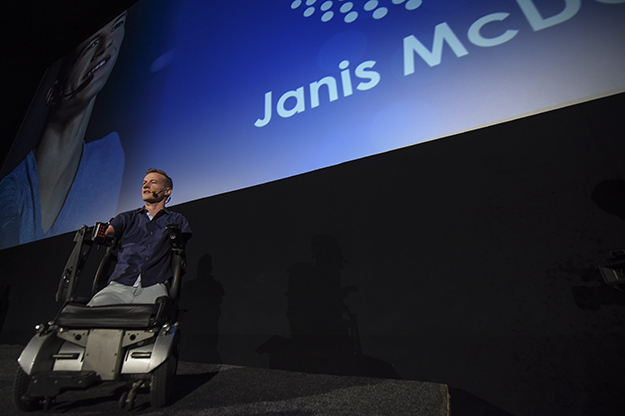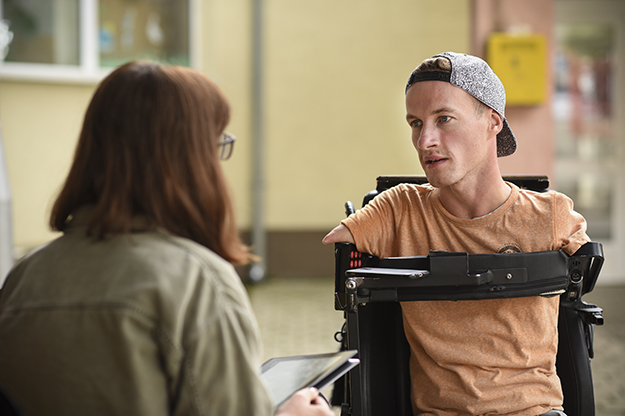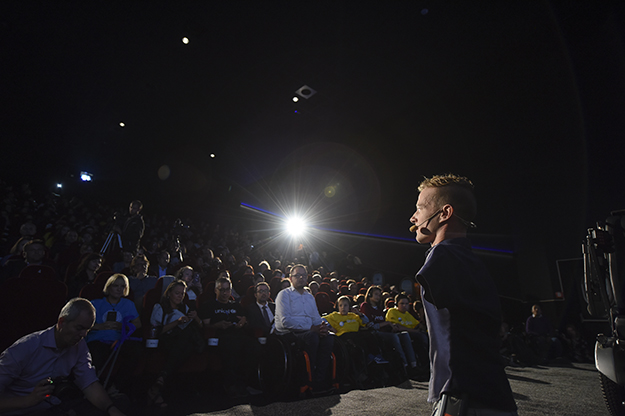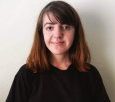All Janis McDavid wanted as a child was to become a policeman and ride a motorcycle. But he was only eight when his dreams were destroyed.
One morning, which he’ll remember forever, he looked at himself in the mirror and for the first time he realized that he would not be like every other child.
“What I saw in the mirror was a body comprised of only a head and a torso,” he says. “I was truly shocked… I didn’t think that I looked like that.”
That sight would be the source of depression and anxiety for many years to come, but it would later become his strongest weapon. Today, as a disabled activist, he has become one of the most inspiring voices in the world.
McDavid, 26, lives between Berlin and Bochum in Germany. He has no limbs. Up to the age of 17, he was at war with himself, but afterwards he began to accept his body.
“That was the moment when I realized that there are many positive things in life and that not everything is bad, not everything is negative,” he says. “That was when I decided to accept my situation, because I couldn’t change it. We have only two paths in life: either we can change something or we can accept it.”
Now David is just about independent. He mainly lives alone in an apartment that is suited to his needs. He eats and drinks on his own, travels often and even drives a car. He mainly needs assistance during trips abroad, where he doesn’t know the infrastructure.
He visited Kosovo in September, when he was the main speaker at Activate Talks, which was organized by UNICEF Kosovo with the objective of bringing together children and teenagers, innovators and experts, to discuss different solutions for the inclusion of children and youths in Kosovo.
In Prishtina, McDavid met and spoke to hundreds of Kosovar pupils, children and youths. During his stay in Kosovo, K2.0 met with him to talk about his life, childhood, challenges, daily routine and mission.
He says that he has decided to only look at the positive things in his life. Since he has no legs, “at least I don’t have to buy shoes,” he says.

Photo: Adi Beqiri / UNICEF
K2.0: You are known as the “traveler without arms and legs,” and an inspiring activist. How and where do you get all the energy?
Janis McDavid: I don’t know… All my audience, they give me a lot of energy. For example, here today, children, they were listening very carefully and watching when we took pictures afterwards.
This gives me a lot of energy because if I see that I could change someone’s life with what I’m talking about, with my words, with my story, then I’m more than happy. Because I want to support others, I want to support children to have an easier life and a better life than me. I think that the decision I have made to accept my situation is the most important decision in our life.
If I have the chance to change the life of others, and if I only change the life of one person, of one child, then I’m more than happy.
What does Janis do on a normal day?
Well, you know my days usually look very boring from the other side. I just get up, have breakfast, and then I’m sitting in front of my computer, thinking about my speeches, thinking about my travels, thinking about where to go, what to do, how to inspire and planning and organizing everything.
I am very happy that I found someone, a woman from Germany, who supports me now with all administration in the background. She’s more than my assistant, my manager at the moment, and I am very thankful that she’s doing so much work.
For example now, I traveled for five weeks, so I will not go home for five weeks. And my days pretty much look like the day to day. I go somewhere, I give a speech, I give interviews, I try to motivate, to inspire people, and yeah, I travel.
This is basically what I’m doing. And if I am at home, then I’m sitting in front of my computer, working.
You live alone. How do you deal with tasks? How do you make it on your own?
Well I would say I live half alone. So I have my own space, but it’s near to my parent’s home [in Bochum, Germany]. And in Berlin I live near my friends. Basically I live together with my friends, but most of the things I can do by myself, so I have learnt to do everything that is important by myself.

Photo: Adi Beqiri / UNICEF
I’ve found my tricks, I am very creative in this. And I only need support and assistance when I travel for example, because I never know how the environment is, how the situation is in other countries, in other cities. And that’s why I usually travel with someone.
For example, now, here in Kosovo, I have brought three very good friends of mine and I am very thankful for this as well, that they support me here, and that they are willing to do all these crazy things with me.
Let’s travel back in time. How was your childhood and how did you react when you realized you were “different” from others?
When I was a child, I didn’t realize that I was different. I always felt like a normal child. And I wanted to become a motorcycle policeman, that was my dream. And I had no doubt that I could become a motorcycle policeman. For me it was very clear, because I didn’t realize that, maybe with my situation, it’s a little bit difficult.
When I was eight years old, one morning — and I can remember that morning as if it was yesterday — I was at home and I was walking in our house, and looked at the mirror. What I saw there in the mirror was basically just a body consisting of a torso and a head, sitting on the ground, and I was really shocked.
That was not how I thought I looked like. I had a completely different image of myself in my mind. I realized it that morning, and I was shocked, I was ashamed, and I felt very bad. I told myself: “Is that me or is that not me, or is that something completely different?”
I couldn’t deal with that situation and this took me quite a long time, until I was 17. So nine years to really overcome this, and to overcome my fight against myself. Because I tried to hide myself, I didn’t really want to go out, I didn’t really want to go to festivals, to the city and all these things. I didn’t really want to meet other people, other children.
I was ashamed and I didn’t want to explain it to them, it was very hard.
So I hid myself. I was sitting at home until one point, when I realized: “Well, if you want to do something with your life, then you have to start now. You cannot sit here for the rest of your life, because then you will change nothing. You can’t have somebody around you, who’s always taking care of you, because the other people, they have their own life as well.”
And that was the point when I decided that I had to change something, I had to go out, I had to try buying these chocolates by myself, I had to try to take my life into my hands and to make the best of it. And I was not sure whether I would succeed. I was very nervous during the first moments, because of course I could have failed. So many things could have happened the first time I entered the supermarket.
“What if I could not be successful and I would be even more frustrated?” This was in my head.
But then, I said to myself: “You have to stop your thoughts now, you have to get your ass out of the house, and you just have to try. What can you lose? If you are not successful, then you try a second time, and a third time, a fourth time. You lose nothing. But there’s so much to win.”
The side of things that I could win was much bigger than the side of things that I could have lost.

Photo: Adi Beqiri / UNICEF
Your dream was to become a motorcycle cop. How difficult was it for you to give up this dream?
It was very difficult for me, not only to give up this dream, but to give up basically everything that my life would look like. I always thought that I would have a normal life like everybody else. That was my dream — to go to university, like everybody else. It was really hard to realize that well, your life will definitely look different.
What are the most unpleasant situations you have faced?
Well, I was really having problems with meeting other children, meeting people that I don’t know, because I feared their questions. You may know, children are always very direct, very open, ask direct questions. They ask everything that we probably would not ask, because we are too polite or whatever.
And nowadays I like it, because you answer the question of a child in a good way, because children are curious, and that’s how they are. And I think that this is a very good thing, and we should not try to stop the curiosity of our children. We should encourage them to be more curious. So nowadays I don’t have a problem with it anymore, because I have my answers and I can talk to them.
But at that time, because I didn’t feel well in my body and I felt ashamed, it was very hard for me. Those were the most unpleasant situations I faced.
Recently, you have gotten involved as an activist with UNICEF. How did this collaboration happen?
I do a lot with UNICEF, but not only with UNICEF. Usually in Germany I work for private companies and all these things, because all those employees need motivation, and sometimes inspiration.
Well, it came by chance that I started to work with UNICEF. I received an email from a good friend of mine, who was in Sri Lanka:
“Hey, it’s completely crazy here. You would not believe what I’m telling you right now, but I have met a Buddhist monk and he has heard about you. He has seen a video about you, and he would like to invite you to Sri Lanka. Would you come?” And I was like “Wow, OK, why not.”
Then I traveled to Sri Lanka and I gave motivational speeches there, and at one speech, I think it was the speech at the German Embassy, there was someone from UNICEF sitting there, listening to me, and she recommended me to her boss, to Philippe Cori, who is now deputy regional director of UNICEF of Europe and Central Asia. He was [at the time] the deputy regional director of South Asia and he was the first one who invited me. That was how everything started.
You have been in Kosovo for a few days. What are your first impressions about infrastructure and how accessible it is for people with disabilities?
I think we have to work a lot on accessibility here. I don’t want to blame anybody, because I am convinced that we can only try changing things if we do it in a positive way, if we do in a motivational way.
But what I realized when I came here is that there are still many obstacles concerning accessibility, but only in terms of getting around the streets. You have pavements that are very high, and they are not flat.
Then, for example, in the restaurant, there is a ramp at one point, but then you still have to cross three steps. This is something I think we need to work on, because this is a fundamental step for anybody to really be a part of society.
But accessibility doesn’t only mean having a ramp, accessibility also means access to information, access to communication, access to education. And I actually dream about a country where we don’t have to talk about accessibility anymore, because we understand that it should be basic. This is a basic thing that everybody needs in order to participate in society, to participate in a country.
This might sound like a cliché question, but what is your main purpose or mission in your life? And what is your message to children with disabilities?
I want to make others strong in their life. I want to make others strong in their dreams and their visions.
I would like to make children strong to reach for what they dream of, for what they want to change, what they want to do. Because I think we can only change our world if we work all together and if we don’t work against each other. And that’s what I realized very often, that people tend to work against each other rather than together. And I really want to try to encourage children, to encourage everybody to do the best in their lives.
We are all good enough, that’s not in question. But I know the situation, where you sit at home, asking yourself: “Am I really good enough? Can I do this?”
I would be very nervous in advance, of the speeches for example. Because we all have this voice inside us, that is always telling us: “Well, you’re not good enough, don’t do this, blame yourself, everyone will laugh at you” — all this.
We have that voice, but we also have the other voice. Maybe it’s a little bit quieter, but we have the other voice telling us: “Well, you are good enough, you can do this. You don’t have to fear being blamed or whatever. If you try your best and if you try out of your heart, you can only succeed.”
I think we need to big up this voice in ourselves and to say to the other voice, “No, thank you! I am good enough. I will not listen to you anymore, if you’re telling me that I’m not good enough.”
Because I know who I am. That’s my message to everybody and I am happy if I can inspire some people with it.K
This conversation has been edited for length and clarity. The interview was conducted in English.
Feature image: Adi Beqiri / UNICEF.




